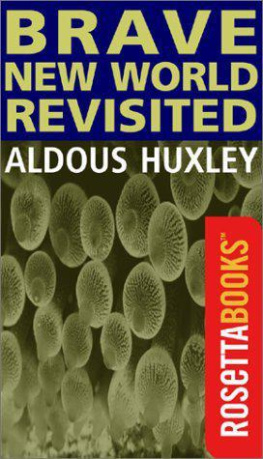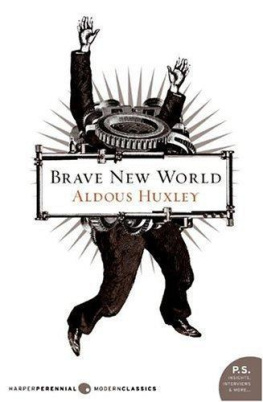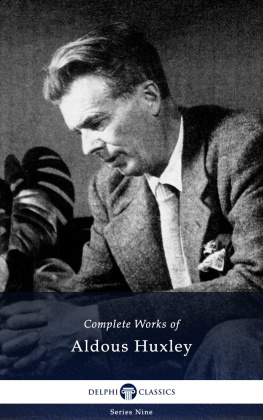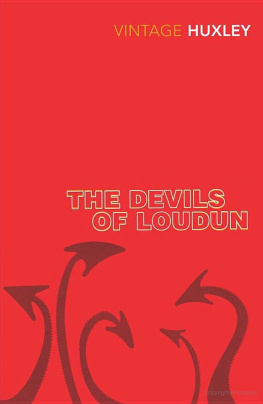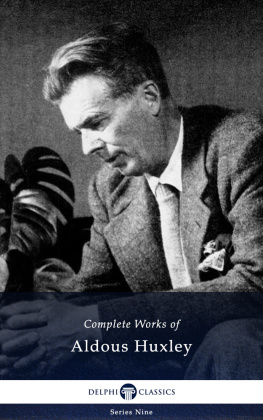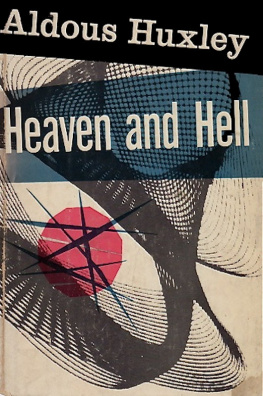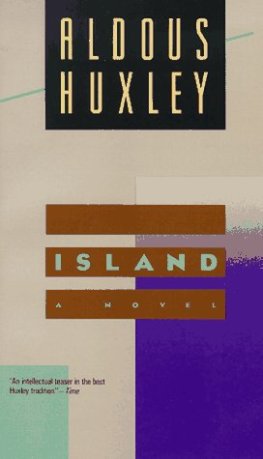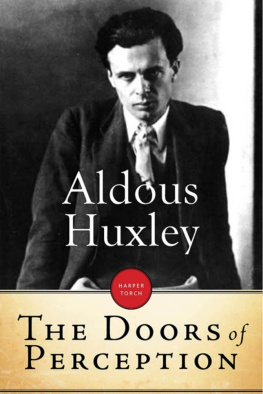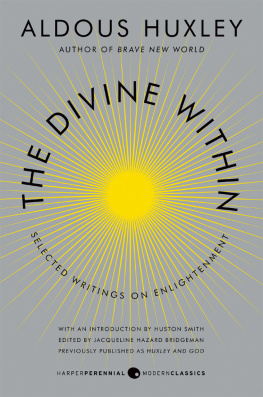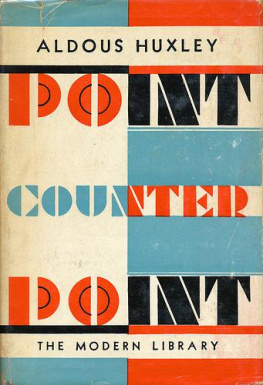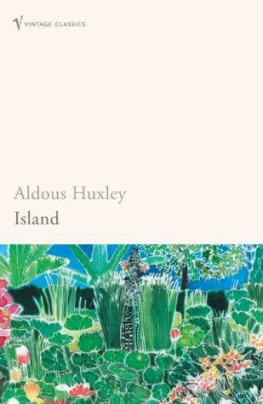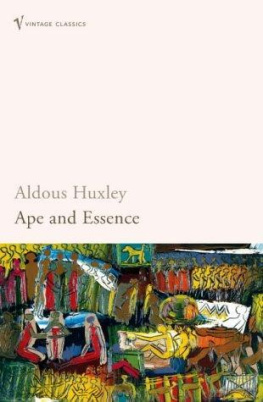Aldous Huxley - Brave New World Revisited
Here you can read online Aldous Huxley - Brave New World Revisited full text of the book (entire story) in english for free. Download pdf and epub, get meaning, cover and reviews about this ebook. year: 2000, publisher: RosettaBooks, genre: Politics. Description of the work, (preface) as well as reviews are available. Best literature library LitArk.com created for fans of good reading and offers a wide selection of genres:
Romance novel
Science fiction
Adventure
Detective
Science
History
Home and family
Prose
Art
Politics
Computer
Non-fiction
Religion
Business
Children
Humor
Choose a favorite category and find really read worthwhile books. Enjoy immersion in the world of imagination, feel the emotions of the characters or learn something new for yourself, make an fascinating discovery.
- Book:Brave New World Revisited
- Author:
- Publisher:RosettaBooks
- Genre:
- Year:2000
- Rating:4 / 5
- Favourites:Add to favourites
- Your mark:
- 80
- 1
- 2
- 3
- 4
- 5
Brave New World Revisited: summary, description and annotation
We offer to read an annotation, description, summary or preface (depends on what the author of the book "Brave New World Revisited" wrote himself). If you haven't found the necessary information about the book — write in the comments, we will try to find it.
Brave New World Revisited — read online for free the complete book (whole text) full work
Below is the text of the book, divided by pages. System saving the place of the last page read, allows you to conveniently read the book "Brave New World Revisited" online for free, without having to search again every time where you left off. Put a bookmark, and you can go to the page where you finished reading at any time.
Font size:
Interval:
Bookmark:



Brave New World Revisited
Copyright 1958 by Aldous Huxley
Cover art and eForeword to the electronic edition copyright
2000 by RosettaBooks, LLC
All rights reserved. No part of this book may be used or reproduced in any manner whatsoever without written permission except in the case of brief quotations embodied in critical articles and reviews.
For information address Editor@RosettaBooks.com
First electronic edition published 2000 by RosettaBooks LLC, New York.
ISBN 0-7953-0016-6




Being something of a prophet can be a grim responsibility. In Brave New World Revisited, a set of essays published in 1958, Aldous Huxley re-examines the issues and concerns that inspired him to write the novel Brave New World some 27 years earlier. What had come to pass, especially in wake of World War II at the height of the Cold War, disturbed Huxley. He saw an overpopulated world that had gravitated toward his dark vision, in which freedom and individualism were willingly exchanged for sensory pleasure and endless consumption, making order out of chaos a world in which people were, as the philosopher Neil Postman suggested, amusing ourselves to death.
Aldous Huxley (18941963) came by his despair honestly. He remains one of the most interesting figures English literature produced in the early 20th century. His early work bespoke his origins, as the well-bred son of one of Englands most distinctive families (his grandfather helped realize Darwins theory of evolution and his great-uncle was Matthew Arnold). But Huxleys clever, stinging satires of English intellectual life (Crome Yellow, Antic Hay) quickly gave way to a new seriousness with the publication of Brave New World. A vision problem had kept him from pursuing a career in medicine, and maturity brought about in him a spiritual restlessness that was encouraged by his friend D.H. Lawrence. For the remainder of his life much of it spent in southern California Aldous Huxley explored political and philosophical issues in his essays and his novels of ideas. Brave New World Revisited reflects the fierce intelligence and clear-eyed perception that informed the best of Huxleys work. It is an invaluable, its-later-than-you-think reality check for every reader of the novel Brave New World.
RosettaBooks is the leading publisher dedicated exclusively to electronic editions of great works of fiction and non-fiction that reflect our world. RosettaBooks is a committed e-publisher, maximizing the resources of the World Wide Web in opening a fresh dimension in the reading experience. In this electronic environment for reading, each RosettaBook will enhance the experience through The RosettaBooks Connection. This gateway instantly delivers to the reader the opportunity to learn more about the title, the author, the content and the context of each work, using the full resources of the Web.
Also available from RosettaBooks is Huxleys Brave New World.
To experience The RosettaBooks Connection for Brave New World Revisited, go to:
www.Rosettabooks.com/BraveNewWorldRevisited

Over-Population

In 1931, when Brave New World was being written, I was convinced that there was still plenty of time. The completely organized society, the scientific caste system, the abolition of free will by methodical conditioning, the servitude made acceptable by regular doses of chemically induced happiness, the orthodoxies drummed in by nightly courses of sleep-teaching these things were coming all right, but not in my time, not even in the time of my grandchildren. I forget the exact date of the events recorded in Brave New World; but it was somewhere in the sixth or seventh century A.F. (After Ford). We who were living in the second quarter of the twentieth century A.D.were the inhabitants, admittedly, of a gruesome kind of universe; but the nightmare of those depression years was radically different from the nightmare of the future, described in Brave New World. Ours was a nightmare of too little order; theirs, in the seventh century A.F., of too much. In the process of passing from one extreme to the other, there would be a long interval, so I imagined, during which the more fortunate third of the human race would make the best of both worlds the disorderly world of liberalism and the much too orderly Brave New World where perfect efficiency left no room for freedom or personal initiative.
Twenty-seven years later, in this third quarter of the twentieth century A.D., and long before the end of the first century A.F., I feel a good deal less optimistic than I did when I was writing Brave New World. The prophecies made in 1931 are coming true much sooner than I thought they would. The blessed interval between too little order and the nightmare of too much has not begun and shows no sign of beginning. In the West, it is true, individual men and women still enjoy a large measure of freedom. But even in those countries that have a tradition of democratic government, this freedom and even the desire for this freedom seem to be on the wane. In the rest of the world freedom for individuals has already gone, or is manifestly about to go. The nightmare of total organization, which I had situated in the seventh century After Ford, has emerged from the safe, remote future and is now awaiting us, just around the next corner.
George Orwells 1984 was a magnified projection into the future of a present that contained Stalinism and an immediate past that had witnessed the flowering of Nazism. Brave New World was written before the rise of Hitler to supreme power in Germany and when the Russian tyrant had not yet got into his stride. In 1931 systematic terrorism was not the obsessive contemporary fact which it had become in 1948, and the future dictatorship of my imaginary world was a good deal less brutal than the future dictatorship so brilliantly portrayed by Orwell. In the context of 1948, 1984 seemed dreadfully convincing. But tyrants, after all, are mortal and circumstances change. Recent developments in Russia and recent advances in science and technology have robbed Orwells book of some of its gruesome verisimilitude. A nuclear war will, of course, make nonsense of everybodys predictions. But, assuming for the moment that the Great Powers can somehow refrain from destroying us, we can say that it now looks as though the odds were more in favor of something like Brave New World than of something like 1984.
In the light of what we have recently learned about animal behavior in general, and human behavior in particular, it has become clear that control through the punishment of undesirable behavior is less effective, in the long run, than control through the reinforcement of desirable behavior by rewards, and that government through terror works on the whole less well than government through the non-violent manipulation of the environment and of the thoughts and feelings of individual men, women and children. Punishment temporarily puts a stop to undesirable behavior, but does not permanently reduce the victims tendency to indulge in it. Moreover, the psycho-physical by-products of punishment may be just as undesirable as the behavior for which an individual has been punished Psychotherapy is largely concerned with the debilitating or anti-social consequences of past punishments.
Copyright | Contents | eForeword |
Font size:
Interval:
Bookmark:
Similar books «Brave New World Revisited»
Look at similar books to Brave New World Revisited. We have selected literature similar in name and meaning in the hope of providing readers with more options to find new, interesting, not yet read works.
Discussion, reviews of the book Brave New World Revisited and just readers' own opinions. Leave your comments, write what you think about the work, its meaning or the main characters. Specify what exactly you liked and what you didn't like, and why you think so.

